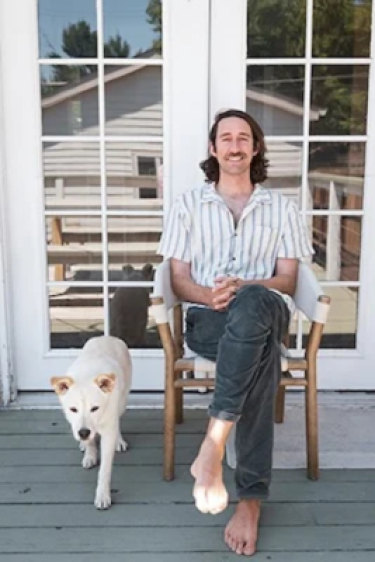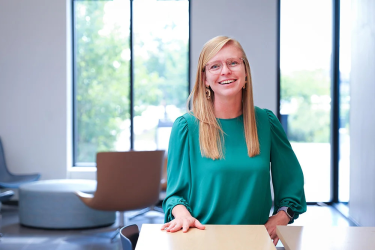Making Their Mark
Three newer Leeds faculty members are regularly in the spotlight for their contributions to their fields and achievements in teaching, having come to CU from top PhD programs and world-class business schools. Their inspiring examples underscore three important concepts to students: Think outside the box. Ask tough questions. Take risks.
That’s how to be innovative, and that’s how to drive progress.
ETHAN POSKANZER
Assistant Professor of Strategy and Entrepreneurship
Frank Schiff Faculty Scholar

Ethan Poskanzer explores the nature of ideas with his students, whom he considers great co-workers. He values their feedback and appreciates their intellectual openness.
That’s the foundation of an entrepreneurial environment, which Poskanzer believes is crucial for societal advancement. “My research is motivated by the idea that innovation is our best weapon to solve important social problems.” Innovation, he asserts, boosts the global economy and living standards by addressing issues like disease and climate change.
Developing transformative technologies, however, isn’t easy, and it takes time. It’s also prone to failures along the way. That’s challenging for startups, which often run out of funds. “We need to design ways for innovators to explore new possibilities and take ‘big swings’ without having to be profitable immediately,” Poskanzer noted. “I’m particularly enthusiastic about the clean technology innovation as a way to address ecological deterioration.”
His work has earned awards and has been published in Organization Science, the American Sociological Review and the American Journal of Sociology, among other leading publications.
Democratizing innovation is a central theme in his research, asking how entrepreneurs can best nurture their ideas and bring them to life. One of Poskanzer’s current projects examines how gender and luck play a role in whose projects get funded. Another study investigates the effect of entrepreneurship training on careers in Accra, Ghana. “There are a ton of entrepreneurship training programs enacted in developing economies, and we know surprisingly little about how they affect participants’ careers,” he said.
AMIT BHATTACHARJEE
Associate Professor of Marketing

The more challenging and divisive the issue, the more it interests Amit Bhattacharjee. He’s drawn to questions and solutions that leaders and policymakers often avoid because they’re “too unintuitive, taboo or politically inconvenient to be palatable.”
Bhattacharjee studies how morality shapes our understanding of the world. He notes that our moral intuitions evolved in small-scale ancestral societies with no growth or technological progress. Conversely, today’s modern markets enable rapid wealth creation, trade with strangers everywhere and occupational specialization at a global scale. Yet this fundamental mismatch makes such benefits deeply unintuitive. Whereas economists see most exchanges as mutually beneficial, the public often perceives them as zero-sum, fueling consumer distrust and policy preferences that depart from scientific consensus. Bridging this gap could help unlock markets’ potential to foster societal prosperity, he said.
His research often “considers what might be good about things that are widely regarded as bad and what might be bad about things with widespread public approval.” This unique approach has garnered recognition, including the 2017 Best Article Award from the Journal of Consumer Research and the 2023 Best Paper Award at the La Londe Conference.
Over the last two years, Bhattacharjee taught undergraduate Marketing Research and Analytics, and he will teach graduate-level Market Intelligence this fall. “The key thing I want students to take away is that whatever it is they hope to achieve in their careers or in their lives, an aptitude for data-driven thinking can help them do it better.” Both his scholarship and teaching reflect his commitment to understanding the beliefs that limit our ability to harness collective knowledge for the greater good.
NIKKI SKINNER
Assistant Professor of Accounting
Craig and Cynthia Smith Faculty Scholar

As a former Leeds student, Nikki Skinner was no stranger to CU, but when she returned as a professor, everything seemed different. What didn’t change was the energy on campus. She loves that the community doesn’t shy away from pressing issues. In her classroom, she’s fostering exactly the take-charge attitude that the Leeds culture embodies.
In just one semester, Skinner developed three new undergraduate and graduate courses on environmental, social and governance (ESG) reporting, a topic that’s evolving so quickly that Skinner can’t find textbooks that keep up with the changes.
To tackle the issues, she and her students analyze current events. “I encourage students to put themselves in the shoes of managers, regulators and investors to understand why things are changing and how companies are handling ESG reporting in real time,” Skinner said.
One of her current projects examines green patenting, finding that managers are now more likely to discuss green technological investments in corporate disclosures than in the past. Innovation was traditionally “hush-hush,” she says, because companies wanted to protect proprietary information.
Skinner’s research keeps her consistently on the radar. In 2023 alone, she was named the Leeds School of Business Craig and Cynthia Smith Faculty Scholar and received the Kolb, B. Summer Teaching Fellowship and Kahle Family Award for Outstanding Leeds School Publication.
What Skinner enjoys most about teaching is learning from her students. “Each of my students offers a unique perspective. Engaging them is what really enriches the classroom.”







